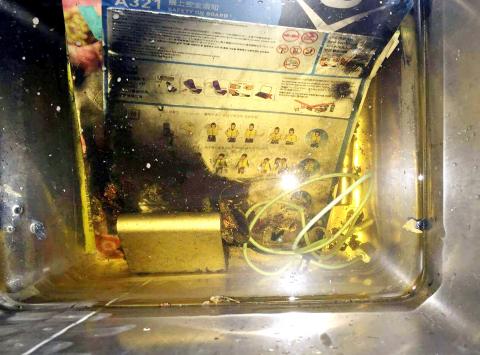A fire broke out in the cabin of a V Air passenger liner bound for Japan on Friday night after a portable battery in a passenger’s carry-on luggage spontaneously caught fire in the first incident of its kind affecting a Taiwanese air carrier, the Aviation Safety Council (ASC) said yesterday.
“This was the first incident of a mobile device power source triggering a fire on a domestic airliner in flight,” council executive director Thomas Wang (王興中) said.
He said that between 1991 and last year there have been more than 170 incidents involving lithium battery explosions on commercial aircraft worldwide, but this was the first case involving a Taiwanese air carrier.

Photo: Copy by Chu Pei-hsiung, Taipei Times
“The council plans to investigate the case,” he said.
The device in question was a lithium battery made in China, the Civil Aeronautics Administration said, adding that it was not immediately clear what type of electronic device it was used to power.
Wang said that the battery did not catch fire because it was on an aircraft in flight, and it would have caught fire even if it had not been brought onto the plane.
There have been discussions on whether mobile power sources should be allowed on airplanes, he said, but cell phones also have lithium batteries and “the possibility of banning them is not high.”
Current practice among the world’s airlines is that mobile power sources — as long as they are kept in carry-on luggage — can be brought aboard aircraft, he said.
Flight ZV252 took off from Taiwan Taoyuan International Airport for Haneda Airport at 10:26pm on Friday.
The fire was put out shortly after it began, and the battery was placed in a bucket of water to ensure that it would not reignite.
All the aircraft’s 161 passengers and crew members were unharmed in the incident.
Due to safety concerns, the captain flew the aircraft back to Taoyuan airport.
The aircraft arrived at the airport at 11:21pm and was confirmed not to have been damaged. The budget air carrier, in consideration of the lingering smell of smoke, arranged for the passengers to take another flight, which left at 12:30am yesterday.
The airline said that the council had confirmed the safety of the aircraft before it was put back into service yesterday.
When the crew members return to Taiwan, they will be questioned so that officials can learn more about the fire, the council said.

The manufacture of the remaining 28 M1A2T Abrams tanks Taiwan purchased from the US has recently been completed, and they are expected to be delivered within the next one to two months, a source said yesterday. The Ministry of National Defense is arranging cargo ships to transport the tanks to Taiwan as soon as possible, said the source, who is familiar with the matter. The estimated arrival time ranges from late this month to early next month, the source said. The 28 Abrams tanks make up the third and final batch of a total of 108 tanks, valued at about NT$40.5 billion

A group from the Taiwanese Designers in Australia association yesterday represented Taiwan at the Midsumma Pride March in Melbourne. The march, held in the St. Kilda suburb, is the city’s largest LGBTQIA+ parade and the flagship event of the annual Midsumma Festival. It attracted more than 45,000 spectators who supported the 400 groups and 10,000 marchers that participated this year, the association said. Taiwanese Designers said they organized a team to march for Taiwan this year, joining politicians, government agencies, professionals and community organizations in showing support for LGBTQIA+ people and diverse communities. As the first country in Asia to legalize same-sex

MOTIVES QUESTIONED The PLA considers Xi’s policies toward Taiwan to be driven by personal considerations rather than military assessment, the Epoch Times reports Chinese President Xi Jinping’s (習近平) latest purge of the Chinese People’s Liberation Army (PLA) leadership might have been prompted by the military’s opposition to plans of invading Taiwan, the Epoch Times said. The Chinese military opposes waging war against Taiwan by a large consensus, putting it at odds with Xi’s vision, the Falun Gong-affiliated daily said in a report on Thursday, citing anonymous sources with insight into the PLA’s inner workings. The opposition is not the opinion of a few generals, but a widely shared view among the PLA cadre, the Epoch Times cited them as saying. “Chinese forces know full well that

Travel agencies in Taiwan are working to secure alternative flights for travelers bound for New Zealand for the Lunar New Year holiday, as Air New Zealand workers are set to strike next week. The airline said that it has confirmed that the planned industrial action by its international wide-body cabin crew would go ahead on Thursday and Friday next week. While the Auckland-based carrier pledged to take reasonable measures to mitigate the impact of the workers’ strike, an Air New Zealand flight arriving at Taipei from Auckland on Thursday and another flight departing from Taipei for Auckland on Saturday would have to